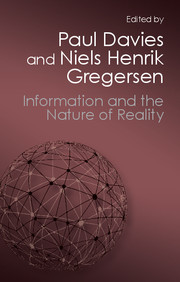Book contents
- Frontmatter
- Dedication
- Contents
- About the authors
- Acknowledgments
- 1 Introduction: does information matter?
- Part I History
- Part II Physics
- Part III Biology
- Part IV Philosophy and Theology
- 12 The sciences of complexity: a new theological resource?
- 13 God as the ultimate informational principle
- 14 Information, theology, and the universe
- 15 God, matter, and information: towards a Stoicizing Logos Christology
- 16 What is the ‘spiritual body’?: on what may be regarded as ‘ultimate’ in the interrelation between God, matter, and information
- Index
- References
16 - What is the ‘spiritual body’?: on what may be regarded as ‘ultimate’ in the interrelation between God, matter, and information
Published online by Cambridge University Press: 05 June 2014
- Frontmatter
- Dedication
- Contents
- About the authors
- Acknowledgments
- 1 Introduction: does information matter?
- Part I History
- Part II Physics
- Part III Biology
- Part IV Philosophy and Theology
- 12 The sciences of complexity: a new theological resource?
- 13 God as the ultimate informational principle
- 14 Information, theology, and the universe
- 15 God, matter, and information: towards a Stoicizing Logos Christology
- 16 What is the ‘spiritual body’?: on what may be regarded as ‘ultimate’ in the interrelation between God, matter, and information
- Index
- References
Summary
This chapter operates from a theological perspective – broadened, however, by information on the development of classical philosophy and metaphysics and some experience in the global science-and-theology discourse of the last 20 years. I ask the question: Can we imagine and penetrate the reality classical theology had in mind when it spoke of the ‘spiritual body’? And beyond that, can we convince non-theological mindsets that this concept not only makes sense in the orbit of religion, but that it has illuminating power beyond this realm because it is firmly rooted in a reality, and not just confined to one complex mode of discourse?
The preparation for this task requires a few sophisticated preliminary steps. First we have to differentiate ‘old-style’ and ‘new-style’ metaphysics as two possible frameworks for the approach. Second, we have to discern an understanding of creation in the light of Biblical creation accounts and in the light of ‘old-style’ metaphysics. Third, on the basis of the Biblical creation accounts, we see that the notion of a creator as a mere sustainer of the universe is spiritually not satisfying and salvific. Fourth, this will prepare us for an understanding of the role of the resurrection in divine creativity in general, and provide an understanding of the nature and the importance of the ‘spiritual body’ of Jesus Christ in particular. Fifth, we will try to comprehend the transformative power of this spiritual body and the involvement of human beings and other creatures in it. On this basis we want to engage non-theological academic thinkers by asking them whether the sustaining, rescuing, and ennobling interaction between God, creation, and spiritual information can find analogies in their realms of experience, and whether it can challenge reductionistic concepts of matter. This question will be guided by a metaphysical approach in the ‘new style’.
- Type
- Chapter
- Information
- Information and the Nature of RealityFrom Physics to Metaphysics, pp. 444 - 463Publisher: Cambridge University PressPrint publication year: 2014



